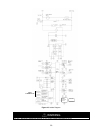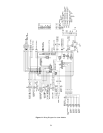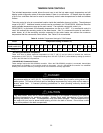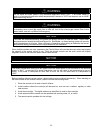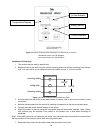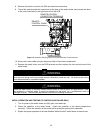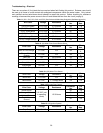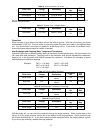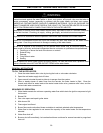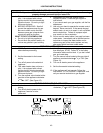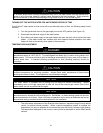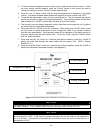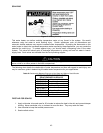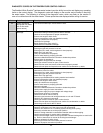
37
Table 16. (FM) Combustion Fan Motor.
Wire Color Voltage Resistance
Connector
No.
Pin
Nos.
Red-Black 6-45 VDC n/a L1 1-2
White-Black 5-10 VDC 9.2-9.4k ohms L1 2-4
Yellow-Black 11-13 VDC 3.5-3.9k ohms L1 2-3
Set your meter to the hertz scale. Reading across the white and black wires at terminals 2 and 4 you should read
between 60 and 420 hertz.
Table 17. Thermal Fuse / Overheat Switch.
Wire Color Voltage Resistance
Connector
No.
Pin
Nos.
Red-White 11-13 VDC Below 1 ohms
B1
E1
B13-
E9
Flame Rod:
Place one lead of your meter to the flame rod and the other to ground. With the unit running, you should
read between 5-150 VAC. Set your meter to micro-amp scale and series your meter in line with the flame
rod. You should read 1 micro-amp or greater for proper flame circuit. In the event of low flame circuit,
remove the flame rod and check for carbon or damage.
Heat Exchanger and Outgoing Water Temperature Thermistors:
Check all Thermistors by inserting meter leads into each end of the thermistor plug. Set your meter to the
20k scale and read resistance. Applying heat to the thermistor bulb should decrease the resistance.
Applying ice to the thermistor bulb should increase the resistance. See below for examples of typical
temperatures and resistance readings.
Example: 59ºF = 11.4-14kΩ 140ºF = 2.2-2.7kΩ
86ºF = 6.4-7.8kΩ 221ºF = 0.6-0.8kΩ
113º = 3.6-4.5kΩ
Table 18. Outgoing Water Thermistor.
Wire Color Voltage Resistance
Connector
No.
Pin
Nos.
White-White n/a
See example
above
E4 E3-E4
Blue-Blue n/a
See example
above
E3 E6-E5
Table 19. Heat Exchanger Temperature Thermistor.
Wire Color Voltage Resistance
Connector
No.
Pin
Nos.
Pink-Pink n/a
See example
above
E2 5-10
Table 20. Surge Protector.
Wire Color Voltage Resistance
Connector
No.
Pin
Nos.
Black-White 108-132 VAC n/a C2 1-3
White-White 108-132 VAC n/a C1 1-3
With the power off, you can check the continuity through the surge protector. Place a meter lead on the
top pin #1 of the surge protector and pin #3 on the bottom of the surge protector. Check across the top
pin #3 and the bottom pin #1. If you read continuity across these two points, the surge protector is good.
If you do not get continuity, replace the surge protector.




